

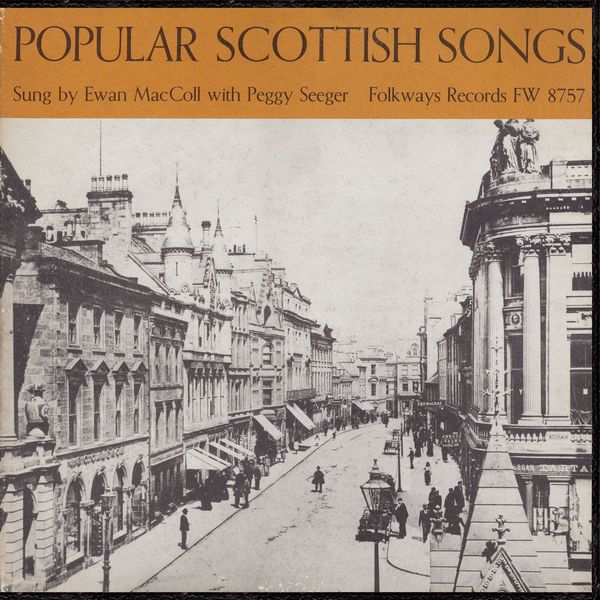 |
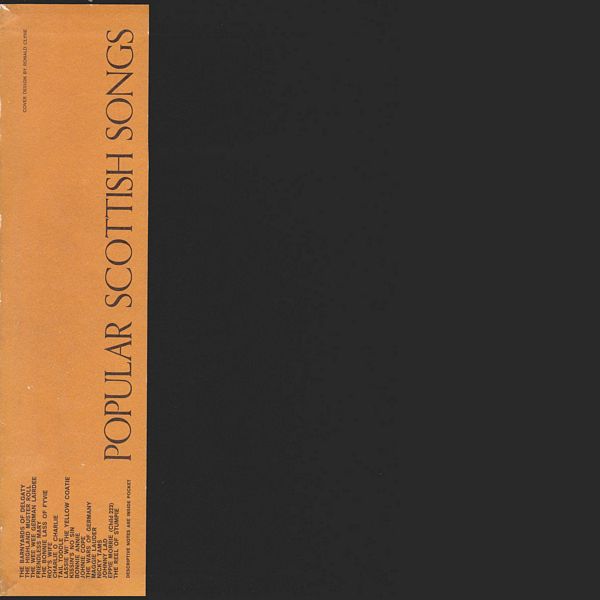
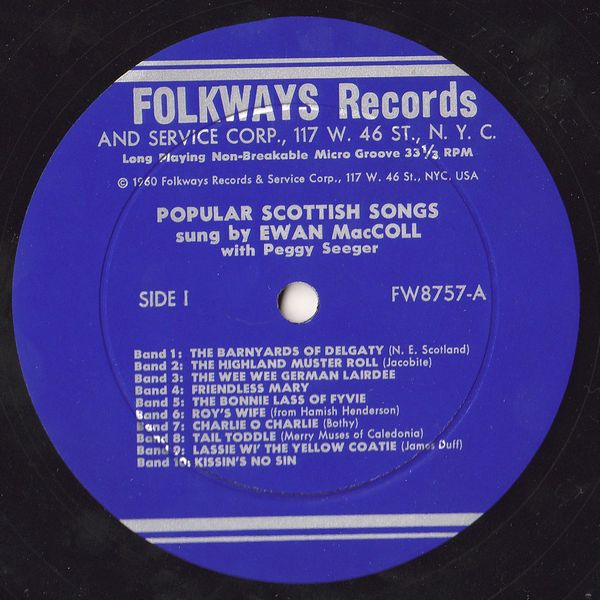
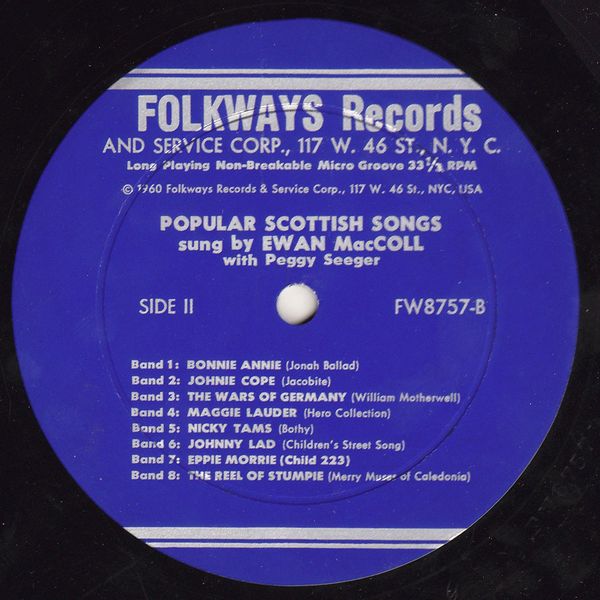
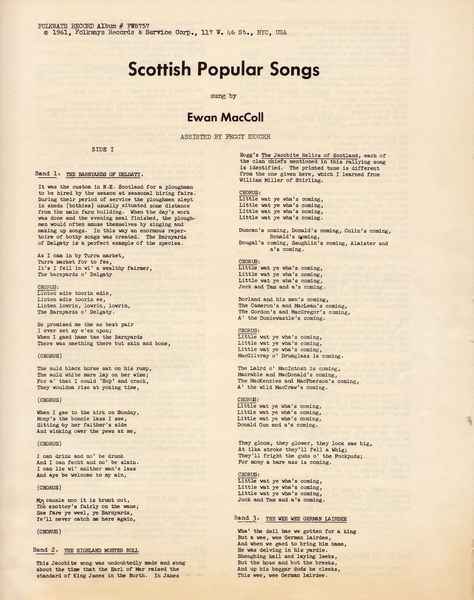 |
Sleeve Notes
EWAN MacCOLL
Ewan MacColl is that rare combination of traditional and revival singer at one and the same time. Born in Auchterarder, Perthshire, Scotland on January 25, 1915 (on Robby Burns' birthday), MacColl learned most of his songs from his father and other members of his family, as well as from Scottish and English neighbors of childhood days. "My old man was the best singer I ever heard," he says. Unlike so many traditional singers whose music was kept alive in relatively isolated rural areas, the MacColl family was a product of the industrial age. His father was an iron-moulder who worked at his trade irregularly as a result of being blacklisted for trade union organizing activities.
His mother, from whom he also learned many songs worked on and off as a charwoman in all the industrial cities of England and Scotland as the MacColls moved from town to town trying to escape the penalties of the father's trade union activities. One writer has called him the "Folksinger of the Industrial Age." During the 1930's, MacColl found himself in the burgeoning British workers' theater movement. His natural political inclinations, together with an instinctive flair for drama and song led him to the "agitprop" performing groups of the depression era whose stage was more often a street before a factory gate or a union meeting hall than a formal theater. In the years since then, he has become the leading presenter of folk songs on British radio and television, either writing or appearing in more than 50 different BBC programs. Song-writer, recording and concert artist (he has toured throughout Europe and Canada), Ewan MacColl is a towering figure in the world of folk music.
PEGGY SEEGER
The trip which brings Peggy Seeger to Newport marks her first visit to the United States since 1957. Darkhaired, pretty Peggy Seeger, daughter of folk musicologists Charles and Ruth Crawford Seeger, has spent the last three years traveling throughout Europe and Asia while maintaining residence in England. At the World Youth Festival in Moscow in 1957, together with Guy Carawan, Peggy Seeger was the voice of American folk song. For the past few years she has collaborated closely with Ewan MacColl, sharing joint concert programs and accompanying the great Scottish, folksinger on concerts and recordings.
Ewan MacColl and Peggy Seerar appeared at the 2nd Annual Newport Polk Festival at Newport, Bhode Island, in the simmer of 1960. These biographical notes are reprinted from the official program of the 1960 Newport Folk Festival.
The Barnyards of Delgaty — It was the custom in N.E. Scotland for a ploughman to be hired by the season at seasonal hiring fairs. During their period of service, the ploughmen slept in sheds (bothies) usually situated some distance from the main farm building. When the day's work was done and the evening meal finished, the ploughmen would often amuse themselves by singing and making up songs. In this way cm enormous repertoire of bothy songs was created. The Barnyards of Delgaty is a perfect example of the species.
The Highland Muster Roll — This Jacobite song was undoubtedly made and sung about the time that the Earl of Mar raised the standard of King James in the North. In James Hogg's The Jacobite Relics of Scotland, each of the clan chiefs mentioned in this rallying song is identified. The printed tune is different from the one given here, which I learned from William Miller of Stirling.
Friendless Mary — The beautiful air of this song is frequently found married to traditional ballad texts. It was a favourite with Mrs. Margaret Logan of Corsham, Wiltshire, from whom I learnt it. In the course of the same afternoon she used it to carry the somewhat humdrum text of "Friendless Mary" as well as the traditional ballad of "The Cruel Mother".
The Bonnie Lass of Fyvie — A great favourite among country singers, particularly in Northeast Scotland, this ballad almost certainly started life as a broadside. Today it is part of the folk tradition and exists in many variants.
Roy's Wife — The 18th. century Scots song-writer, Mrs. Grant of Carron, made a version of this song, basing her text on an older "vulgar" version. Today, both versions are found in circulation. This variant of the older version was learned from Hamish Henderson.
Charlie O Charlie — There are few bothy songs which speak with the farmer's voice, and when they do, they often tend to be rather dull. This is not the case with this song, however. The thread of tender irony which runs through it helps to make the farmer's portrait a realistic one. I learned this song from the singing of John Mearns of Fyvie.
Tail Toddle — Robert Bums included this small gem in his collection of Scots bawdry, The Merry Muses of Caledonia. Scott-Douglas, that indefatigable bowdlerizer of good verse, attributes it to the Bard himself. But, as usual, he produces no evidence to back this assertion.
Lassie Wi' The Yellow Coatie — The author of this song, James Duff, known as "The Methven Poet", was a gardener by trade. A volume of his poems which includes the text of this song, was published in Perth in 18l6. It is now fairly well known throughout Northeast Scotland.
Kissin's No Sin — The frank expression of physical desire in Scots love songs has been a subject of dismay among collectors and folklorists who, for almost 200 years, have been apologizing for Herd and the lower classes' capacity for love-making. But it is the common people who have the last word and if the intonation of this ironical little song is stock minister, the sentiments are pure republican.
Bonnie Annie — (Child 24)Jonah ballads have never had the wide currency in Scotland that they have in England. Gavin Grieg was able to report only two fragmentary Scottish texts of "Bonnie Annie" against the 9 versions collected by Cecil Sharpe in England.
The Jonah ballads are generally built round a central character who has committed a crime and who has taken ship in an attempt to fly from the consequences of it. In Child's "A" text of this ballad, the passengers on board a ship cast lots to determine which of them is guilty of a crime, and the lot falls repeatedly on Annie. The details of her "crime" are not given and, indeed, it is possible that her crime lies in the simple fact that she is a woman, since an old sea superstition holds that women on board inevitably bring bad luck at sea.
This belief is still widely held by fishermen in Great Britain today.
Johnie Cope —
The Wars of Germany — Ever since the Scots nation was disinherited by the Act of Union, its sons have been killing and getting themselves killed in the service of foreign powers.
The Scots people, however, have never ceased to look upon war as a wasteful and tragic business. The great number of Scotland's war songs (excepting the Jacobite songs and ballads) are laments, like "The Flowers of the Forest," "Jamie Foyers," and "The Wars of Germany". The words of this particular song are the work of William Motherwell, a Glasgow shoemaker who plied his craft at the beginning of the 19th-century, I learned the song from Margaret Logan of Corsham, Wiltshire.
Maggie Lauder — This song is widely known in Scotland, both by those who accept it at its face value as a rollicking description of a country dance and by those who see in it a highly elaborate piece of sex symbolism.
Burns said of it: "This old song, so pregnant with Scottish naivete and energy, is much relished by all ranks, notwithstanding its broad wit and palpable allusions." It first appeared in print in Herd's collection and has often been attributed, with little supporting evidence, to Francis Sempill, who lived and wrote during the middle of the 17th-century.
Nicky Tams — Bothy songs are also known as "cornkisters". Every bothy had its corn kist (corn chest), and when rhythmical songs were being sung, it was the practice of the singer to keep time by "tapping his foot against the wooden chest which also served as a seat. "Nicky Tams" is one of the most famous of the cornkisters. The title refers to those leggings, leather straps or mere loops of string, with which farm servants used to protect the bottoms of their trousers. This version comes from David Johnson of Cupar, Fyfeshire.
Johnny Lad — Originally a song of rural courtship in the tempo of a slow (minor) strathspey, "Johnny Lad" moved to Glasgow during the late 19th-century and was transformed into a children's street song. As the lyric became urbanized, the original air was abandoned in favor of a catchy but much plainer tune.
Eppie Morrie — (Child 223) Child knew this ballad from a single printed source, Maidment's A North Country Garland (l824). Of it, Maidment wrote: "This ballad is probably much more than a century old though the circumstances which have given rise to it were unfortunately too common to preclude the possibility of its being of a later date." Thin version I learned in part from my father, partly from Samuel Wylie of Falkirk, and partly from the text printed by Child.
The Reel of Stumpie — This is another of the songs collected by Burns and published in his collection of amorous verses. The Merry Muses of Caledonia, where it has three stanzas. The version given in tile Scots Musical Museum, possesses only two. The air is well-known as a dance tune and many traditional fiddle variants exists.